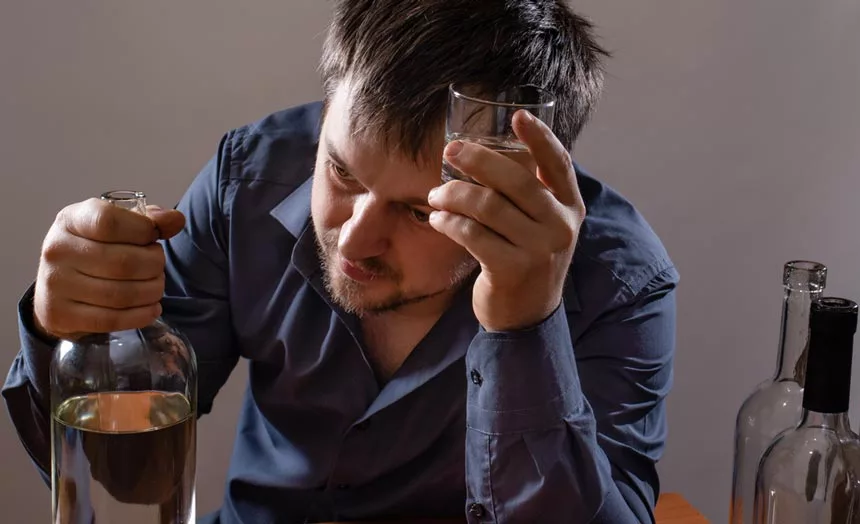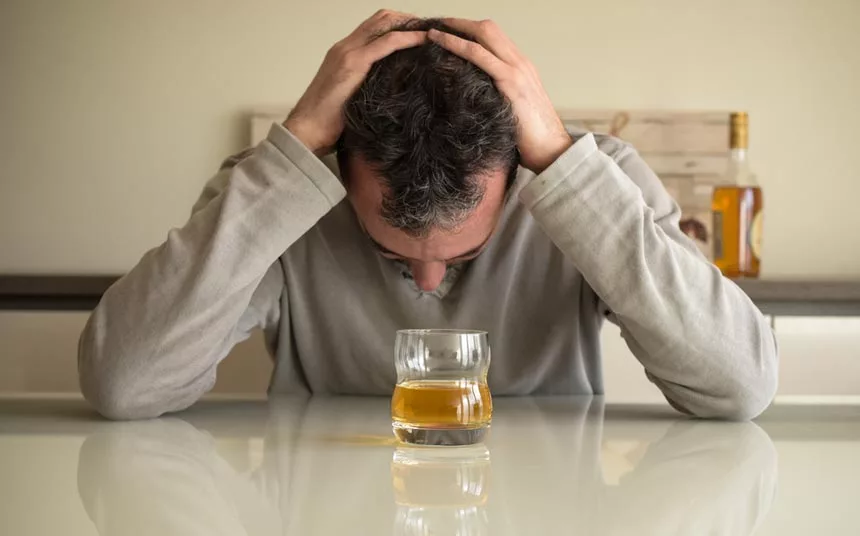Alcohol and PTSD
Table of Contents
- Alcohol and PTSD
- Can Alcoholism Cause Post-Traumatic Stress Disorder?
- Recognizing PTSD Symptoms
- Recognizing the Signs of Alcohol Abuse
- Does Alcohol Make PTSD Symptoms Worse?
- PTSD and Binge Drinking: What You Should Know
- Dual Diagnosis Treatment for Alcohol Abuse and PTSD
- Find Treatment for Alcohol Addiction and PTSD Today
- FAQs About Alcohol and PTSD
Alcohol use disorder and post-traumatic stress disorder are two mental health disorders that commonly exist at the same time — a condition known as dual diagnosis, or co-occurring disorders, of which alcohol and PTSD are a common variety.
Evidence reveals that people who suffer from PTSD are between two and four times more likely to also suffer from a substance use disorder than those without PTSD. In terms of the links between alcohol and PTSD, post-traumatic stress disorder and binge drinking is common among U.S. war veterans, many of whom use alcohol to drive away bad memories surrounding combat trauma.
However, both PTSD and alcohol use disorders are not strictly reserved for veterans. Anyone can develop PTSD, including those who have experienced sexual assault, childhood neglect, and abuse, or otherwise experienced a trauma of any kind. For these individuals, it can be all tempting to self-medicate with alcohol or other drug use.
Co-occurring disorders can be fully treated at many addiction treatment centers. Post-traumatic stress disorder and alcohol treatment usually involve an alcohol detox, followed by therapy that helps patients learn to manage and overcome trauma without relying on alcohol to escape their symptoms.
If you’re struggling with substance abuse and post-traumatic stress disorder, understand that you’re not alone and that treatment is available to help you overcome both disorders. Here’s what you need to know about the link between alcohol addiction and post-traumatic stress disorder, and how to find alcohol and PTSD treatment.
Can Alcoholism Cause Post-Traumatic Stress Disorder?

PTSD is widely known to trigger alcohol misuse, but can alcoholism cause post-traumatic stress disorder? The answer is yes. People with co-occurring PTSD and substance use disorders are often at increased risk for events like car accidents and domestic violence that result in trauma.
Alcohol and PTSD can also drive conflicts and feelings of isolation among family members, and lead to situations that sometimes result in the worsening of traumatic reactions.
A recent study conducted by researchers at the University of North Carolina School of Medicine found that coping mechanisms like heavy alcohol use can rewire brain circuitry in a way that makes it more difficult for alcoholics to recover from traumatic events.
Alcoholics who continue experiencing anxiety, flashbacks, and fear in wake of traumatic events may eventually be diagnosed with PTSD. Attempting to self-medicate with alcohol can ultimately be detrimental to a wide variety of mental disorders.
Recognizing PTSD Symptoms
People suffering from a mental illness like PTSD will experience several symptoms and side effects. In particular, it is characterized by hyperarousal symptoms such as intense fear, anxiety, and a feeling of helplessness, as well as intrusive memories or flashbacks of the traumatic event.
Symptoms of PTSD can range from mild to severe and can include nightmares, intrusive thoughts, avoidance of places or people that may trigger memories of the trauma, difficulty concentrating, difficulty sleeping, increased irritability, and difficulty managing emotions.
People suffering from PTSD often experience difficulty in their daily lives. They may feel overwhelmed and have difficulty functioning in their daily tasks. They may have a hard time concentrating and experience strain in their relationships due to their fear and anxiety.
They may also have trouble sleeping, either due to nightmares or intrusive thoughts. People with PTSD may also experience sudden and sometimes hyper-realistic memories of the traumatic event, which can be very distressing.
PTSD can also produce physical symptoms, such as headaches, stomach aches, and muscle tension. Those struggling with this disorder may also have difficulty controlling their emotions, which can lead to outbursts of anger or sadness. They may also be more easily startled than usual and may be easily overwhelmed in social situations.
PTSD can be a difficult disorder to live with, especially if the individual is struggling with alcohol problems on top of this condition, but it is possible to manage it with the right treatment and support. If you or someone you know is experiencing symptoms of PTSD, the Find Addiction Rehabs team can help.
Recognizing the Signs of Alcohol Abuse

Alcohol abuse is a growing problem in the United States and it’s important to know the signs so that you can help those in your life who may be struggling. Fortunately, according to the Diagnostic and Statistical Manual of Mental Disorders (DSM-5) many warning signs can signal whether you or a loved one is struggling with alcohol use.
The first sign of alcohol abuse is the amount of drinking that is taking place. If someone is drinking more alcohol than they used to, they may be abusing this substance. They may be drinking more often and in larger amounts than before. This hazardous drinking can be an indication that they are having trouble controlling their behavior.
Another sign is if they are drinking at inappropriate times or in inappropriate places. This could include drinking while at work or drinking in public places. It could also mean that they are drinking in situations that are dangerous, such as before driving or operating machinery.
Another sign of alcohol abuse is if someone is neglecting their responsibilities due to their drinking. If someone is skipping work or school because of their drinking, or if they are missing important appointments due to this behavior, this could be a sign of a problem.
If someone is using alcohol to cope with negative emotions or to make themselves feel better, this could also be a sign of abuse. Using alcohol to cope with stress or anxiety is a crutch and keeps the individual from dealing with the underlying issues.
They may also begin mixing alcohol with other substances to enhance its effects, which can have several risk factors for both their physical and mental well-being. Overall, there are some signs that can be looked out for when trying to determine if someone may be abusing alcohol. If you recognize any of these behaviors in yourself or a loved one, it may be time to get professional help.
Does Alcohol Make PTSD Symptoms Worse?
Many who suffer from post-traumatic stress disorder use alcohol to cope with their symptoms or to make them disappear. But alcohol has been shown to worsen PTSD symptoms. In particular, alcohol consumption can make insomnia, depression, and nightmares associated with PTSD worse.
Drinking alcohol to self-medicate for PTSD makes it more difficult for you to cope with stress and bad memories. This self-medication can even lead to drinking problems, including alcohol dependence and addiction.
A common alcohol PTSD trigger is insomnia. Insomnia can be caused by other PTSD symptoms such as stress, anxiety, agitation, and fear — all of which can spike your body’s cortisol and adrenaline levels to keep you awake.
But some people who suffer from PTSD-induced insomnia will turn to alcohol under the impression it helps them sleep. Unfortunately, alcohol spikes the PTSD sufferers’ blood sugar to cause restless sleep and can worsen problems with insomnia.
Nightmares are another common alcohol and PTSD connection. Some who suffer from PTSD may drink alcohol with hopes of eliminating bad dreams or reducing the horrifying elements of their nightmares. But alcohol fails to address the root cause of bad dreams and can lead to prolonged symptoms of PTSD.
PTSD and Binge Drinking: What You Should Know

Binge drinking rates tend to be higher among those who suffer from PTSD compared to the general population. Two separate studies examined the effects of the 9/11 attacks and Hurricanes Katrina and Rita on binge drinking rates among those exposed to these events.
Researchers found that binge drinkers were highest among those who experienced the greatest exposure and highest levels of trauma from these disasters.
Suffering from a post-traumatic stress disorder and drinking increases your risk for a blackout. A blackout occurs when you consume too much alcohol in a short period of time, which causes your blood alcohol levels to rise more rapidly.
An alcohol and PTSD blackout is an interval of time during which you cannot remember certain events while consuming alcohol and usually happens after binge drinking sessions related to reliving trauma.
The Center for Disease Control reports that one in every six adults in the U.S. engages in binge drinking about four times per month. Though binge drinking may be common, binge drinking to treat symptoms of PTSD can increase the risk for problems with alcohol dependence and addiction down the road.
Dual Diagnosis Treatment for Alcohol Abuse and PTSD

There are many effective treatment options available to help individuals overcome their alcohol or drug dependency and co-occurring mental health conditions. When it comes to treating PTSD, the best approach for this is typically intensive therapies and possibly medications in more severe cases.
For those who have a problem with drinking alcohol or drug abuse, the treatment for this will be similar, although it may require more clinical and intensive care to successfully recover from these problems.
In cases where someone is struggling with simultaneous substance abuse and mental health issues, it will take a bit more to properly address this. Both their addiction and their mental health condition will need to be evaluated and addressed for the individual to successfully recover.
Dual diagnosis treatment for alcohol use disorder (AUD) and PTSD is essential for those who struggle with both conditions. While alcohol is often used as a coping mechanism to manage the symptoms of PTSD, it can also lead to unhealthy dependence.
Therefore, dual diagnosis treatment is necessary to address both a PTSD and AUD diagnosis and help the person return to a healthy lifestyle. This type of treatment typically involves a combination of medication and therapy.
Therapies Used to Treat Alcohol Addiction and PTSD
Therapy can be beneficial in helping the person seeking treatment to better understand the connection between their trauma and their drinking, and develop coping strategies to better manage their symptoms.
Cognitive-behavioral therapy is a type of therapy that is often used in dual diagnosis treatment. This type of therapy can help individuals identify and modify thought patterns and behaviors that are contributing to their drinking and/or PTSD symptoms.
Furthermore, it can help individuals develop healthier coping strategies, such as relaxation techniques and journaling, to better manage their symptoms. Individual, group, and family therapy can all be valuable recovery tools, as well.
Support groups can also be helpful in dual diagnosis treatment for alcohol and PTSD. These groups allow individuals to share their stories, receive support from others who understand their struggles and learn from one another. Support groups can also be a source of motivation for individuals to stay on track with their recovery goals.
Medications Used to Treat Alcohol Abuse and PTSD
Medication is often used to treat both conditions. For instance, antidepressants are commonly prescribed to treat many of the depressive symptoms those with PTSD report, while benzodiazepines may be used to reduce alcohol cravings and withdrawal symptoms that may occur when addicted individuals stop drinking.
These are just a couple of examples of what medications will be used during the treatment process. The exact medicines that will work best for each person will vary based on the person receiving treatment and will be decided between them and their healthcare provider.
Find Treatment for Alcohol Addiction and PTSD Today

If you or your loved one is struggling with addiction, call our 24/7 confidential helpline to speak in private with a specialist. We work with an extensive network of treatment professionals and rehab programs that can safely and successfully help you recover from your PTSD and alcohol use disorder.
The recovery representatives at Find Addiction Rehabs will help you find recovery options nationwide and help you overcome your co-occurring disorders so you can move forward with a happier and healthier life.
FAQs About Alcohol and PTSD
Who is at Risk of Developing PTSD?
While anyone can experience PTSD, some people are more at risk of developing the condition than others, particularly trauma survivors who do not have the support or resources to cope with their trauma memories.
The most common risk factor for PTSD is being exposed to a traumatic event, such as a natural disaster, combat, sexual abuse, or motor vehicle accident, are more likely to develop PTSD than those who have not.
In most cases, these violent traumatic events consist of uncontrollable trauma, where the individual experiencing them has no way of preventing or avoiding them from happening.
Should I Avoid Alcohol if I Have PTSD?
If you have been diagnosed with post-traumatic stress disorder (PTSD), you may be wondering if you should avoid alcohol. The answer is yes, you should definitely avoid alcohol if you have PTSD.
Alcohol is a depressant, which means it can make you feel low, helpless, and anxious. If you have PTSD, alcohol can make these feelings worse and can increase your risk of developing more serious mental health problems.
Alcohol also interferes with your ability to cope with the symptoms of PTSD, such as flashbacks, nightmares, and difficulty sleeping. If you have PTSD, it’s important to understand that alcohol can worsen your symptoms and make it harder to manage your condition.
Drinking can also make it more difficult to follow the treatment plan prescribed by your doctor. Ultimately, it is best to avoid drinking if you have recently experienced trauma or are recovering from a PTSD diagnosis.
Charles F. has been an active part of the Florida recovery community for over 5 years. He began as a behavioral health technician at an addiction treatment facility in Ocala, Florida and has since begun training as a Licensed Addiction and Chemical Dependency counselor in Boca Raton. Charles’ passion involves the promotion of recovery and helping spread the hope of recovery to as many readers as possible!


